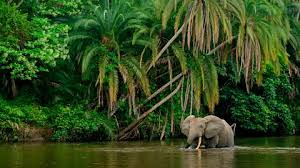Matthew Walley looks out over the vast forest that has provided generations of sustenance for his Indigenous tribe in Liberia. There’s still a feeling of anxiety, even as the bright morning sun dances across the canopy. They have banded together to fight against the prospect of losing their means of subsistence since their use of the land is under threat.
The government of Liberia has agreed to sell the Dubai-based company Blue Carbon approximately 10% of the country’s land, or 10,931 square kilometres (4,220 square miles), to protect forests that would otherwise be cut down and used for farming, which is the main source of income for many communities.
Blue Carbon intends to profit from this conservation by selling carbon credits to polluters to offset their emissions while they burn fossil fuels. The company did not reply to multiple emails and calls requesting comment.
While some scientists claim the concept has little value for the climate, campaigners called it “carbon colonialism.” The property is owned by Indigenous peoples, according to Liberian law, and the government has no legal claim to it, according to activists. Months after Blue Carbon’s founding, in March 2023, the government and the firm agreed without first engaging the nearby people, who were worried about a lack of protections.
“We don’t have rules and regulations to fight for ourselves as a community because there is no legal framework on carbon credits in Liberia,” said Walley, whose town, Neezuin, may see around 573 square kilometres signed over to Blue Carbon.
Large tracts of land on the continent might become Blue Carbon’s property thanks to a series of agreements between the corporation and at least five African nations. Indigenous communities in Kenya have already been forced to relocate to make room for other carbon credit schemes, as reported by human rights organizations including Survival International and Amnesty International.
The programmes have drawn criticism for being “culturally destructive,” opaque, and endangering the food security and livelihoods of rural African inhabitants.
“A lot of these initiatives are linked to horrifying violations of human rights committed by park rangers against nearby communities,” stated Simon Counsell, an independent investigator of conservation initiatives in Kenya, the Congo, Cameroon, and other nations.
“Almost none had ever sought or gained the landholders’ consent; the majority had involved evictions and conflicts with locals,” stated Counsell, a former director of Rainforest Foundation UK, a nonprofit organization that promotes environmental protection and human rights.
Despite having the lowest greenhouse gas emissions, Africa has abundance of natural resources, including forests, which are vital to the fight against climate change. Because they have historically depended on trees for their livelihoods, indigenous populations emphasize the conflict between climate aims and economic reality.
These kind of conservation efforts draw the attention of financially stressed African governments, despite reservations about transparency and violations of human rights, because they provide much-needed revenue.
Laptops 1000On its website, Blue Carbon states that it is working on a single project in Zimbabwe that encompasses almost 20% of the nation’s area.
But since its founding in late 2022, the corporation may have obtained enormous tracts of land in Tanzania, Kenya, Liberia, Zambia, and other nations through murky arrangements.
Before exploiting a community’s land for such transactions, the government in Liberia should inform the community before any agreement. Activists and communities contend that even without it, former President George Weah’s administration continued.
Local communities were first made aware of the agreement when activists organized against it after a leak via a network of nonprofit organizations. Despite the agreement’s intention to hold community consultations in November of last year, residents and campaigners claimed this did not occur.
Ambulah Mamey, a Liberian activist who has aided in organizing resistance to the Blue Carbon contract, stated, “There is no opposition to fighting climate change, but it has to be done in a way that respects people’s rights and does not breach the law.”
Weah’s government terminated the agreement before last year’s presidential election in response to complaints from communities and activists, but he still lost.
The community leader, Walley, stated, “We resolved to vote out the George Weah government to stop the deal, which will devastatingly affect communities, but we don’t know if the new government will restart it.” “We’re holding out for them.”
The Blue Carbon contract was hurried through “a quick process that does not lend itself to a good level of transparency,” according to Emmanuel Yarkpawolo, the newly appointed director of Liberia’s Environmental Protection Agency.
While acknowledging that the agreement has been put on hold, he added that Liberia is now creating regulations for the sale of carbon credits that will “emphasize the balance between environmental goals and economic well-being of our people and take care of concerns about Indigenous people’s rights, including alternative livelihood means.”
In March, Blue Carbon invited developers to submit suggestions for projects including carbon offsets. Activists provided a copy of the corporate paper, which stated that applicants will receive basic land information but not which countries are the focus.
Laptops 1000Given the substantial area of land involved in certain countries, the process appears to be “extraordinarily opaque,” according to conservation researcher Counsell. He expressed doubts about the understanding of it by governments and the residents.
Counsell stated that “The U.N. should very specifically be guarding against these kind of opaque and inequitable arrangements as it continues to develop the rules for a global carbon market.”
Sheikh Ahmed Dalmook Al Maktoum, a monarch of the United Arab Emirates whose private assets include fossil fuel enterprises, launched Blue Carbon. The governments or businesses that will purchase the credits produced by their carbon projects have not been made public.
Debatable is the efficacy of carbon offsetting in and of itself. The idea of “additionality,” or the quantity of carbon that a project says it reduces by stopping deforestation, raises some questions. Those reductions may have occurred in many cases regardless.
According to research conducted by Counsell and Survival International, livestock farmers whose livelihoods were disrupted by the Northern Kenya Grassland Carbon Project had been operating within “broadly sustainable limits.”
According to Walley, this is comparable to communities in Liberia, where they are required by law to preserve trees and go about their daily lives. Furthermore, 40% of Liberia’s forest area is currently under protection.
Counsell explained, “This means that in terms of climate, the project has no ‘additionality,’ and any carbon credits generated do not represent genuine new savings of carbon.”
Additionally, Counsell noted that the idea of forests forever absorbing carbon is undermined by the fact that over time, trees undergo natural ageing, forest fires, or commercial use, which releases the carbon they are storing back into the atmosphere.
Another issue is that there is “zero” benefit to the climate. Deforestation may occur elsewhere as a result of conservation efforts when impacted communities relocate in search of employment.




















